By Tom Travis
“It’s a slap in the face and a kick in the behind. The State brought a piggy bank when they should have brought a safe. They brought a piggy bank to pay us and it’s not right to pay between 80,000 and 100,000 people.”
So said former Mayor Karen Weaver in a fiery speech to protesters who gathered at City Hall today to voice their opinions of the $641 million Flint water crisis settlement.
Activist Tonya Burns welcomed the group of local activists, politicians and community leaders gathered on the lawn, and began by stating why the protesters were there: “We are concerned about compensation. What we want them to do is to go back to the table and take their calculations and and redo the litigation because this is an abomination.”
The group of about 25 included Weaver, 1st Ward Councilperson Eric Mays, Nayyirah Shariff, Claire McClinton, Tonya Burns, Claudia Milton-Perkins, Laura MacIntyre, Christina Sayyae, NAACP leader and Weaver’s former assistant Aonie Gilchrist, Black Lives Matter president DeWaun Robinson Art Woodson, and Father Dan Scheid.
City Council to vote on $20 million portion of settlement Monday
City Council held a special meeting Thursday that lasted more than five hours to discuss the details of the water crisis settlement with attorneys. The Flint City Council will vote Monday Dec. 14 on whether to accept a $20 million portion of the $641 million Flint water crisis settlement. That $20 million would come from the city’s insurance company. Because the City of Flint is named as a defendant in the water crisis settlement, the insurance company is offering this amount to the settlement.
Former Mayor Karen Weaver speaks against the $641 Flint water crisis settlement
Weaver spoke next, expressing a sentiment that seemed to match the views of the rest of the group. “This is absolutely awful and we need to say no. It’s not fair and it’s not fair for this community,” she said to cheers.
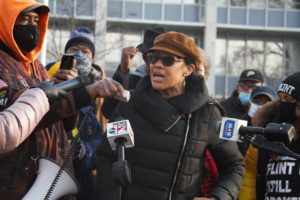
Former Mayor Karen Weaver speaks on the lawn of City Hall Friday protesting the Flint water crisis settlement offered by the State. (Photo by Tom Travis)
Weaver thanked Councilman Mays for his work on bringing forward the discussion of the settlement, saying, “He had the courage, strength and audacity to have a conversation about this. Thank you, Councilman Mays.”
Weaver compared and contrasted the water crisis settlement amounts with the amount of $500 million that Michigan State University offered to pay “between 330 and 340 people” in the gymnasts’ sexual abuse scandal of former Olympic doctor Larry Nasser. In contrast, she noted, the State is offering $400 million to pay 80,000 to 100,000 people, the residents of the City of Flint.
“Now what kind of math is that? And how do those kind of numbers make sense? They don’t, they don’t add up,” Weaver blasted.
“The State poisoned us, they’ve killed some of us. The State did that. We have kids that will never be able to reach their potential, the State did that. We have women who had miscarriages, the State did that. Our special education rates are skyrocketing and the State did that. And they want to get off scot-free. They want to pay this money and go home. And we’re supposed to be quiet and to be satisfied. Well that’s not happening,” Weaver said.
Weaver, calling for elected officials, asked, “Where are the elected officials that are supposed to be speaking up and speaking out for us? Where are they? Councilman Mays is here. But where are the rest of the elected officials?
“Our Mayor [Sheldont Neeley] has told us to take the money. He’s thanked the governor for bringing a piggy bank to make the payments. We have two state representatives, [Cynthia]Neeley and [John] Cherry, and we haven’t heard anything from them. It’s been crickets.
“We’ve got a state senator that wants to push it [the water crisis settlement] through and thinks it’s a good idea. No one is speaking up and speaking out on behalf of the citizens of Flint. No one has been held accountable for what has happened. We had an attorney general that said, ‘charges will be pressed. You all put us in office and we will make Flint whole.’ Well, when does that happen? We had people downtown that told us the water was fine and it was a hoax, said Weaver.
“The State wants us to sit down, shut up and take these crumbs that they’re giving us. They all seem to be working for the State rather than the state of the people. They need to be working for the state of the people here in the city of Flint. This payment is not fair, this payment is not just, it’s a slap in the face. Flint hasn’t been made whole, take your knee off our neck and fix Flint,” Weaver said as the group gathered around her cheered.
“Power to the People” is Milton-Perkins message
Local activist and water warrior Claudia Milton-Perkins wore a scarf that said, “Power to the People.” Milton-Perkins said, “Look at my scarf and see what it says, ‘Power to the People.’ “Power to the People means truth and justice.”
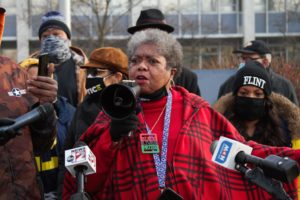
Water Warrior Claudia Milton-Perkins speaks to a crowd of protesters on the lawn of City Hall. (Photo by Tom Travis)
“Flint has not been made whole.”
Laura MacIntyre, a member of the Democracy Defense League and recently elected Flint School Board member, said, “Flint has not been made whole. We are here to say no to the water settlement, to say no to the deal that’s been put before us.”
“We still do not have all the details of the deal that has been put before us. We have nothing in writing. We have a summary of facts. We are being asked to sign a deal that we don’t even know the details of.
Activist and member of the Democracy Defense League, Laura MacIntyre, speaks to protesters at City Hall Friday. (Photo by Tom Travis)
“We do not have the details of something that we are being coersed into giving an answer for. That is wrong and it’s indicative of the fact and it’s representative of how we’ve been treated this whole time. My shirt says, ‘Five years and counting. Flint is still broken.’ This shirt is two years old. It’s going on seven years of the water crisis,” MacIntyre said.
According to settlement documents, MacIntyre pointed out, “Health claims for the children is capped at $20,000 for the rest of their lives. For children who have untold damage, this is neurological. This is a neuro poison, a neuro toxin and we’re being forced to say we haven’t been poisoned and we’ve just been exposed.
“The list goes on and on. How much more are we expected to take of these insults added on to these injuries? Flint is a test case for neo-liberalism and privatization and these unjust policies,” she said.
Councilperson Eric Mays wants to “tweak” the settlement
Councilperson Eric Mays thanked a diverse crowd of “black and white” residents as he put it who showed up to protest the settlement. Mays suggested that the City Council needs to “tweak” the settlement offer by adjusting the amounts that will be given in the children categories.
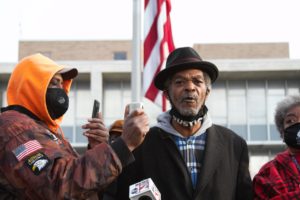
Eric Mays, 1st Ward councilperson, speaks on the lawn of City Hall Friday. (Photo by Tom Travis)
The water crisis settlement will largely compensate minor children at 80 percent (65 percent for ages six and under, 10 percent for children ages 7 to 11 and 5 percent for children ages 12 to 17). As laid out in the settlement agreement, 18 percent will go towards adult claims (15 per cent) and property damage claims (3 per cent). The final and 2 per cent will go towards special education for “students who suffer long-term health and behavioral impacts from lead exposure,” economic losses and programmatic relief.
Mays stated that according to his calculations the estimated payment will be $536 for each adult.
“Don’t believe attorneys that say the pot can get bigger. Don’t believe a person who is sitting in that office up there[motioning towards City Hall], who I haven’t rubber stamped yet. Don’t believe them when they say ‘the pot can get bigger’. The settlement has been submitted.
“And if the pot gets bigger under this formula, we got a problem. So what we propose is that the formula must be changed. The 3 percent is for property folks might have to be 8 or 10 percent. Where do you take that percentage from? We propose taking it from the attorneys.
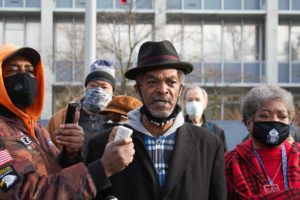
Eric Mays, 1st Ward councilperson speaks to a crowd gathered on the lawn of City Hall protesting the Flint Water Crisis Settlement. (Photo by Tom Travis)
“The children are at 5 percent (in the 13-17 age range) of the $400 million. We’ve been told there are about 12,000-14,000 children in each of the categories.
Mays said he calculates this would equate to a payment of about $1600/per child.
In the 10 percent category of children between ages 7 and 12 approximately a $3,300 per child payment and children in the 20 percent category $20,000 per child payment.
“But it’s not time to settle yet. We need to tweak some things yet. We shouldn’t have to make a decision before we see the total picture. We shouldn’t have to vote on a settlement and hope for more,” Mays said.
Governor Gretchen Whitmer and Attorney General Dana Nessel both issued statements at the time the settlement was released. Whitmer called the agreement “just one of the many ways we continue showing our support for the city and residents of Flint,” while Nessel called the settlement “the best possible outcome for Flint’s future.”
EVM reported last week that additional amounts added to the settlement include: $20 million from the City of Flint’s insurance company and $20 million from McLaren Medical Center, and $1.25 million from Rowe Professional Services who provided the city’s engineering services between 2002 and 2016. McLaren executives deny claims that they were a source of the outbreak of Legionnaires disease which sickened 90 and took at least 11 lives in 2014 and 2015 and was linked by some sources to the tainted Flint water.
Other lawsuits are still pending. Michigan publication Bridge reported in a Nov 18 article, “Attorneys for the plaintiffs are still suing Lockwood, Andrews & Newman and Veolia, two engineering firms that advised the state and city during the crisis, along with separate litigation against the U.S. Environmental Protection Agency.”
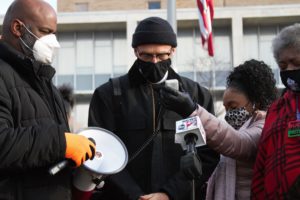
Father Dan Shied of St. Paul’s Episcopal Church was asked by protesters to close the event in prayer. (Photo by Tom Travis)
Flint City Council will meet electronically at 5:30 p.m. Monday, Dec 14. The public and the media can join by calling in to listen or to speak during public speaking by calling 617-944-8177. The meeting can also be viewed on a YouTube live stream at www.youtube.com/channel/UCo2BdarsY5qNtQSTP9Lfi3Q.
EVM Managing Editor Tom Travis can be reached at tomntravis@gmail.com.

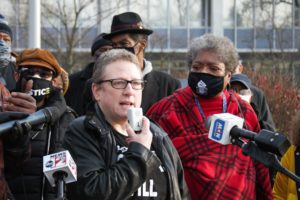

You must be logged in to post a comment.